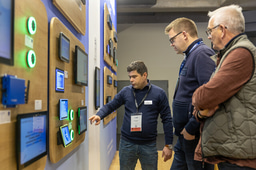E Ink partners with AUO to develop larger ePaper signage

Image Credit: AUO Corporation
E Ink Corporation has recently announced a partnership with AUO Corporation to develop new, larger-format color electronic paper displays. The partnership is another in a growing trend of digital signage manufacturers looking to the potential of electronic paper, hoping to utilize the benefits the technology offers. AUO has only recently arrived in pro AV, debuting as an exhibitor at ISE 2024, but the company is no stranger to developing a wide range of display formats, occasionally making a foray into novel applications.
Electronic ink, or E Ink, is most commonly associated with its use in electronic paper, commonly found in e-readers. E Ink functions by running an electric current through micro-capsules in the e-reader's display, rearranging black and white pigments contained within the micro-capsules to form text or monochromatic images. The e-reader only draws power when the display is refreshed (i.e. when the page is turned), greatly increasing both battery and service life. Because of its constrained applications in contrast to LCD or LED displays, however, E Ink found limited interest in commercial markets outside of specific functions.

Electronic paper is most commonly associated with e-readers, as reading static pages does not require a high refresh rate. Image Credit: Maarten van de Heuvel
As the AV industry looks to become more sustainable and build higher-quality products, innovative alternatives have gained greater traction. Philips also recently announced their own full color ePaper display, touted as the world's largest, albeit at 32 inches. Electronic paper signage is still relatively early in technological maturity, but an uptick in research and development may see strides being made, both in price and capability. For static signage applications, electronic paper makes sense by reducing waste and power consumption while making it easier to instantly change what's being displayed.
Adopting electronic paper in common digital signage applications represents a sensible, pragmatic application of an existing technology that might be considered seldom seen in recent times. In a time where so much of developing technology is about "disrupting the field" or chasing buzzwords, it can be easy to sideline incremental opportunities that nonetheless make a big impact. Other manufacturers have also been working at a steady pace to take advantage of the opportunity, potentially crossing over into commercial applications in the near future.
Recommended Content
The Immersive Industry Doesn’t Have a Creativity Problem. It Has an Operating Model Problem.






Please sign in or register for FREE
If you are a registered user on AVIXA Xchange, please sign in
This is great news. So far I have seen E Ink e-paper in small size and few applications. This will change the digital Signage landscape.
But how are you managing to reproduce all colures? There are certain color restrictions, right?
I Would like to know more about this product.
Regards,
Harish. N
I have seen this news in AV CHAMPS Linkedin Group
That's a great question! I was checking out the press release here:
https://www.eink.com/news/detail/E%20Ink-and-AUO-Enter-into-Strategic-Partnership-to-Develop-Large-Size-Color-ePaper-Displays
There weren't any further details I saw, but I wouldn't be surprised if it operates the same way as the monochrome version does, just with color filled micro-spheres!
Thank you